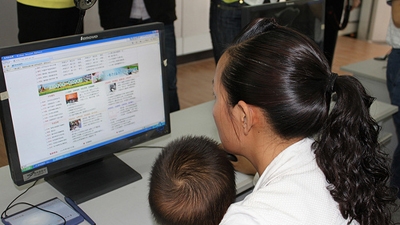A survey covering 3,000 households in China’s Guizhou, Jilin and Shandong provinces finds that only around a quarter of the villages surveyed had their own public facility for villager to access internet. But among the villagers who responded that they use the Internet, less than 5 percent actually use the public internet facility in their own village.
In the meantime, a study on rural public libraries in China shows that in these same provinces, over half of the villages have a library or a reading room and almost a third of them are connected to internet. But just over 5 percent of the villagers surveyed said they visited library in the previous year.
These two researches, ICT Demand Survey and Study on Libraries Landscape, were led by the World Bank, as part of its support to the Chinese government to make decisions on piloting innovative projects that would improve access to ICT in rural areas so that individuals and businesses there could have better access to information, markets, and services and become more competitive.
The World Bank together with the State Information Center of China recently hosted two workshops to share the key findings. Over fifty participants from various government ministries, universities, research institutions and the provinces attended.
After absorbing the information gathered by the survey on the attitudes, awareness and access of ICT in China’s rural areas, participants discussed and concluded that the public libraries or library-like public services in rural areas must be made better use of and there is definitely a need to increase digital literacy in villages. They also welcomed greater use of tools such as surveys and impact assessments to evaluate policies related to promoting ICT access in rural areas.
Libraries can be an important public venue for providing ICT access in rural areas and teaching digital skills to villagers, the participants conclude after discussing the findings of the Study on Libraries Landscape. While there has been significant investment in deploying small libraries or reading rooms into rural areas, budget for the ongoing operations of them is still limited.
Another challenge is the current administrative structure of the public library system that inhibits networking between large libraries in urban areas and smaller rural ones. To address this, Qiu Guanhua, former director of Suzhou Municipal Library offered the model adopted in his municipality – Suzhou Municipal Library takes responsibility for supporting all the 45 public libraries in its geographical region, regardless of the administrative level at which they operate, whether it is a reading room in a village or a relatively bigger library in a county. “This system resulted in better allocation of resources and improved capacity in smaller branches,” he said.
At the workshop, Li Hong, Director of the Chinese Information Resource Sharing Project (CIRSP) supported by the Ministry of Culture, introduced the way in which digital content and ICT infrastructure is being rolled out through libraries and library-like services across China and also outlined the Public Electronic Reading Room Construction Plan which aims to cover comprehensively every village in China by 2015.
Natasha Beschorner, a senior ICT policy specialist with the World Bank, proposed the concept of rural ICT centers to all participants. These centers, which could leverage public libraries already in existence, will serve as a hub for digital literacy training and other lifelong learning, e-government services, networking among rural businesses, as well as local wireless access point for communities, she said.
These two studies, together with another one assessing the impact of rural interventions in rural ICT access, which is expected to be released in the first quarter of 2013, are funded by a grant from the Bill & Melinda Gates Foundation.

